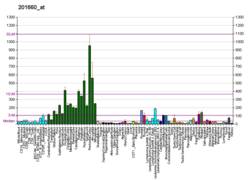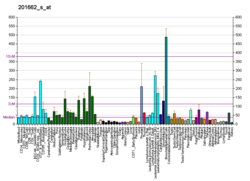Long-chain-fatty-acid—CoA ligase 3 is an enzyme that in humans is encoded by the ACSL3 gene.
Function
The protein encoded by this gene is an isozyme of the long-chain fatty-acid-coenzyme A ligase family. Although differing in substrate specificity, subcellular localization, and tissue distribution, all isozymes of this family convert free long-chain fatty acids into fatty acyl-CoA esters, and thereby play a key role in lipid biosynthesis and fatty acid degradation. This isozyme is highly expressed in brain, and preferentially utilizes myristate, arachidonate, and eicosapentaenoate as substrates. The amino acid sequence of this isozyme is 92% identical to that of rat homolog. Two transcript variants encoding the same protein have been found for this gene.
References
- ^ GRCh38: Ensembl release 89: ENSG00000123983 – Ensembl, May 2017
- ^ GRCm38: Ensembl release 89: ENSMUSG00000032883 – Ensembl, May 2017
- "Human PubMed Reference:". National Center for Biotechnology Information, U.S. National Library of Medicine.
- "Mouse PubMed Reference:". National Center for Biotechnology Information, U.S. National Library of Medicine.
- ^ "Entrez Gene: ACSL3 acyl-CoA synthetase long-chain family member 3".
External links
- Human ACSL3 genome location and ACSL3 gene details page in the UCSC Genome Browser.
Further reading
- Brueton LA, van Herwerden L, Chotai KA, Winter RM (Oct 1992). "The mapping of a gene for craniosynostosis: evidence for linkage of the Saethre-Chotzen syndrome to distal chromosome 7p". Journal of Medical Genetics. 29 (10): 681–685. doi:10.1136/jmg.29.10.681. PMC 1016122. PMID 1433226.
- Bakken AM, Farstad M, Holmsen H (Feb 1991). "Identity between palmitoyl-CoA synthetase and arachidonoyl-CoA synthetase in human platelet?". The Biochemical Journal. 274 ( Pt 1) (1): 145–52. doi:10.1042/bj2740145. PMC 1149932. PMID 1848073.
- Bronfman M, Inestrosa NC, Nervi FO, Leighton F (Dec 1984). "Acyl-CoA synthetase and the peroxisomal enzymes of beta-oxidation in human liver. Quantitative analysis of their subcellular localization". The Biochemical Journal. 224 (3): 709–20. doi:10.1042/bj2240709. PMC 1144505. PMID 6240978.
- Rose CS, King AA, Summers D, Palmer R, Yang S, Wilkie AO, Reardon W, Malcolm S, Winter RM (Aug 1994). "Localization of the genetic locus for Saethre-Chotzen syndrome to a 6 cM region of chromosome 7 using four cases with apparently balanced translocations at 7p21.2". Human Molecular Genetics. 3 (8): 1405–1408. doi:10.1093/hmg/3.8.1405. PMID 7987323.
- Fujino T, Kang MJ, Suzuki H, Iijima H, Yamamoto T (Jul 1996). "Molecular characterization and expression of rat acyl-CoA synthetase 3". The Journal of Biological Chemistry. 271 (28): 16748–16752. doi:10.1074/jbc.271.28.16748. PMID 8663269.
- Bonaldo MF, Lennon G, Soares MB (Sep 1996). "Normalization and subtraction: two approaches to facilitate gene discovery". Genome Research. 6 (9): 791–806. doi:10.1101/gr.6.9.791. PMID 8889548.
- Minekura H, Fujino T, Kang MJ, Fujita T, Endo Y, Yamamoto TT (May 1997). "Human acyl-coenzyme A synthetase 3 cDNA and localization of its gene (ACS3) to chromosome band 2q34-q35". Genomics. 42 (1): 180–181. doi:10.1006/geno.1997.4710. PMID 9177793.
- Minekura H, Kang MJ, Inagaki Y, Suzuki H, Sato H, Fujino T, Yamamoto TT (Oct 2001). "Genomic organization and transcription units of the human acyl-CoA synthetase 3 gene". Gene. 278 (1–2): 185–192. doi:10.1016/S0378-1119(01)00714-4. PMID 11707336.
- Strausberg RL, Feingold EA, Grouse LH, Derge JG, Klausner RD, Collins FS, Wagner L, Shenmen CM, Schuler GD, Altschul SF, Zeeberg B, Buetow KH, Schaefer CF, Bhat NK, Hopkins RF, Jordan H, Moore T, Max SI, Wang J, Hsieh F, Diatchenko L, Marusina K, Farmer AA, Rubin GM, Hong L, Stapleton M, Soares MB, Bonaldo MF, Casavant TL, Scheetz TE, Brownstein MJ, Usdin TB, Toshiyuki S, Carninci P, Prange C, Raha SS, Loquellano NA, Peters GJ, Abramson RD, Mullahy SJ, Bosak SA, McEwan PJ, McKernan KJ, Malek JA, Gunaratne PH, Richards S, Worley KC, Hale S, Garcia AM, Gay LJ, Hulyk SW, Villalon DK, Muzny DM, Sodergren EJ, Lu X, Gibbs RA, Fahey J, Helton E, Ketteman M, Madan A, Rodrigues S, Sanchez A, Whiting M, Madan A, Young AC, Shevchenko Y, Bouffard GG, Blakesley RW, Touchman JW, Green ED, Dickson MC, Rodriguez AC, Grimwood J, Schmutz J, Myers RM, Butterfield YS, Krzywinski MI, Skalska U, Smailus DE, Schnerch A, Schein JE, Jones SJ, Marra MA (Dec 2002). "Generation and initial analysis of more than 15,000 full-length human and mouse cDNA sequences". Proceedings of the National Academy of Sciences of the United States of America. 99 (26): 16899–16903. Bibcode:2002PNAS...9916899M. doi:10.1073/pnas.242603899. PMC 139241. PMID 12477932.
- Mashek DG, Bornfeldt KE, Coleman RA, Berger J, Bernlohr DA, Black P, DiRusso CC, Farber SA, Guo W, Hashimoto N, Khodiyar V, Kuypers FA, Maltais LJ, Nebert DW, Renieri A, Schaffer JE, Stahl A, Watkins PA, Vasiliou V, Yamamoto TT (Oct 2004). "Revised nomenclature for the mammalian long-chain acyl-CoA synthetase gene family". Journal of Lipid Research. 45 (10): 1958–1961. doi:10.1194/jlr.E400002-JLR200. PMID 15292367.
- Beausoleil SA, Jedrychowski M, Schwartz D, Elias JE, Villén J, Li J, Cohn MA, Cantley LC, Gygi SP (Aug 2004). "Large-scale characterization of HeLa cell nuclear phosphoproteins". Proceedings of the National Academy of Sciences of the United States of America. 101 (33): 12130–12135. Bibcode:2004PNAS..10112130B. doi:10.1073/pnas.0404720101. PMC 514446. PMID 15302935.
- Qiao S, Tuohimaa P (Nov 2004). "Vitamin D3 inhibits fatty acid synthase expression by stimulating the expression of long-chain fatty-acid-CoA ligase 3 in prostate cancer cells". FEBS Letters. 577 (3): 451–454. Bibcode:2004FEBSL.577..451Q. doi:10.1016/j.febslet.2004.10.044. PMID 15556626. S2CID 25190904.
- Rohozinski J, Lamb DJ, Bishop CE (Apr 2006). "UTP14c is a recently acquired retrogene associated with spermatogenesis and fertility in man". Biology of Reproduction. 74 (4): 644–651. doi:10.1095/biolreprod.105.046698. PMID 16354793.
- Tu LC, Yan X, Hood L, Lin B (Apr 2007). "Proteomics analysis of the interactome of N-myc downstream regulated gene 1 and its interactions with the androgen response program in prostate cancer cells" (PDF). Molecular & Cellular Proteomics. 6 (4): 575–588. doi:10.1074/mcp.M600249-MCP200. PMID 17220478. S2CID 7203032.
- Zhou Y, Abidi P, Kim A, Chen W, Huang TT, Kraemer FB, Liu J (Oct 2007). "Transcriptional activation of hepatic ACSL3 and ACSL5 by oncostatin m reduces hypertriglyceridemia through enhanced beta-oxidation". Arteriosclerosis, Thrombosis, and Vascular Biology. 27 (10): 2198–2205. doi:10.1161/ATVBAHA.107.148429. PMID 17761945.
This article on a gene on human chromosome 2 is a stub. You can help Misplaced Pages by expanding it. |






